Australia ranks third for climate change denial, media blamed
Australia has ranked third in the world in this category in a new analysis – but it might not be something to be all that proud of.
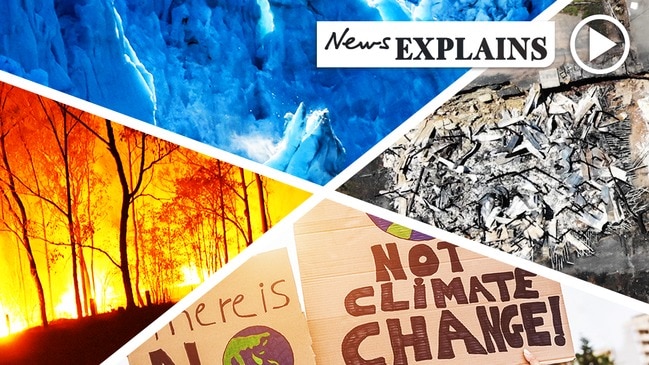
Climate Change
Don't miss out on the headlines from Climate Change. Followed categories will be added to My News.
Australia has almost three times as many climate change deniers as the global worldwide average – and apparently it’s the media’s fault.
A new analysis of Australian news consumers (that’s you – thanks for your support!) found 18 per cent of people think climate change is not a serious issue.
Of those, 10 per cent said the issue was not very serious and 8 per cent said it was not at all. Another 15 per cent said they straight up don’t pay attention to news about climate change (that number climbs to 21 per cent in regional areas).
Australia is ranked third in the world for climate change denial (those 8 per cent of people who say it’s not at all a serious issue), behind the United States (12 per cent) and Sweden (9 per cent).
The University of Canberra’s News and Media Research Centre is a partner in the Reuters Institute for the Study of Journalism at Oxford University.
RELATED: Virus forces huge drop in global emissions
RELATED: Here’s where we get our power

RELATED: Scientist annihilates climate comments
As part of that arrangement the university compiles the Australian version of the annual Digital News Report, and recently released its sixth iteration of the study.
“This year we asked about climate change, if people are concerned about the issue and where they get news and information about it,” the report reads.
Researchers said the results, from a total sample size of 2131 people, show climate change is “at the forefront of many Australians’ minds” and that around 80 per cent said it was somewhat, very, or extremely serious.
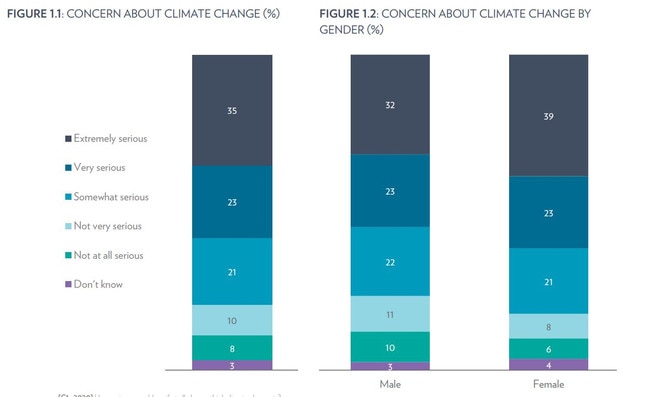
RELATED: ‘Rubbish’: Bushfire myths debunked
They noted regional and rural news consumers were less likely to think it was a serious problem “despite the drought, bushfires and floods”.
Men were more likely than women to think climate change wasn’t a big deal.
Younger Australians tended to be more concerned, with only 1 per cent of Gen Z respondents saying climate change was not at all a serious issue, whereas 20 per cent of those aged over 74 did not think climate change was serious at all.

In a statistic (that will surely stun many), the report also found news consumers who get most of their news from “left-wing” sources (The Guardian, The Conversation et al) were more concerned about climate change than those who get the bulk of their news from “right-wing” sources.
A total of 93 per cent of the “left” consumers were concerned, compared to 63 per cent of “right” consumers.
The latter consumers were also less likely to want their world view challenged.
Almost a quarter of those surveyed who rely on social media for news wanted it to tell them what they already thought.
Australians who rely on commercial AM radio stations for their news (such as the Nine network owned 2GB, 3AW, 4BC etc) or who subscribe to News Corp’s (publisher of this website) 24-hour news channels Sky News and Fox News were less likely to think climate change was a serious issue.
“These brands are known for their high-profile presenters who challenge the scientific consensus on climate change,” the report reads.
RELATED: Attenborough’s grim ’last chance’ warning
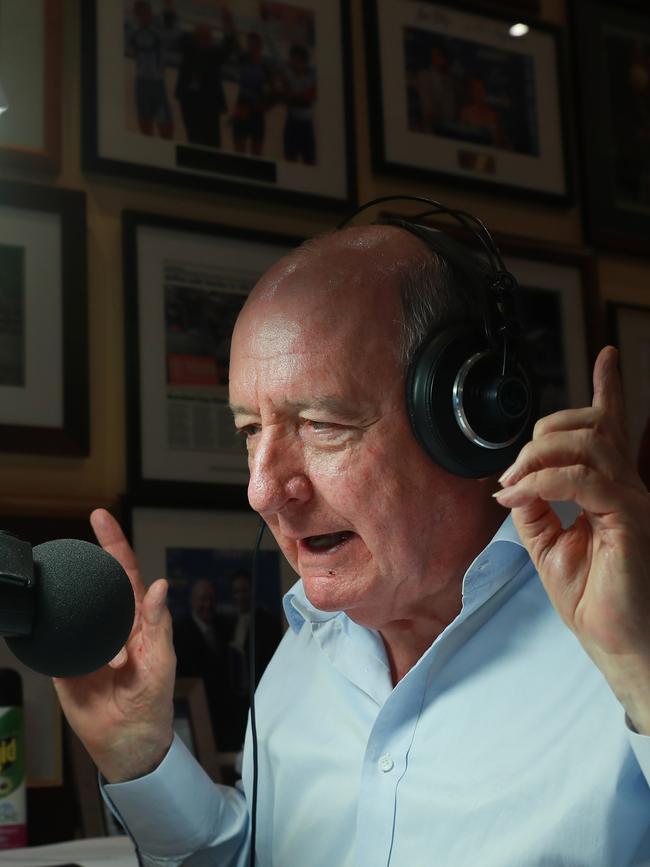
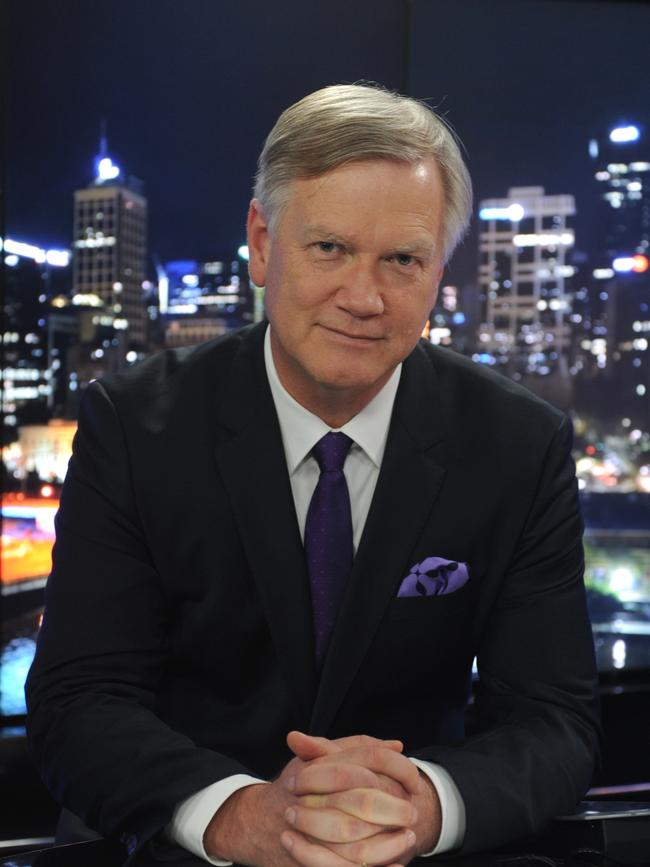

RELATED: Never charge your phone again
Around 35 per cent of radio listeners and Sky News viewers didn’t buy the science, and 32 per cent of Fox News consumers didn’t either.
Nine’s television audience was slightly more concerned with only 20 per cent climate change sceptics, and its newspaper readers (The Sydney Morning Herald, The Age and The Australian Financial Review) were the most concerned of all.
We’ll have to wait until next year’s report to see if the retirement of 2GB Sydney’s breakfast host (who was also syndicated on 4BC in Brisbane) and vocal climate change denier Alan Jones will have any impact on that number.
Thirteen per cent of readers of the country’s only national broadsheet The Australian (also published by News Corp) said they weren’t concerned about climate change.
And 36 per cent of survey respondents said they believe reporting on climate change is accurate while 33 per cent said they believe it is not.
This could be why 15 per cent said they got climate change news from “non-news” sources such as blogs (9 per cent) and social media posts (6 per cent).
Those who took climate change seriously were more inclined to believe the reporting was accurate, but still only 47 per cent of them believed it was.
Television news was the main source of climate change content (28 per cent), and 47 per cent of people who get most of their news from TV trust it, compared to an average trust level of 38 per cent, in line with the global average.
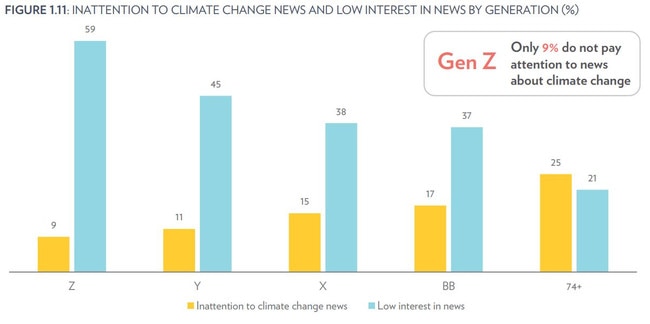
According to University of Canberra journalism lecturer and Guardian columnist Greg Jericho, the difficulty of covering climate change is two-fold.
“So much of a journalist’s job when reporting on climate change is devoted to correcting falsehoods,” Jericho wrote in his commentary following the data.
“It is hard enough to convey scientific knowledge to the layperson without having to compete with news organisations who devote large space and time to those who push the view that climate change is a conspiracy,” he said.
He also said “bothsider” journalism wasn’t helping, but that just blaming the brands whose audiences skew towards climate denial wouldn’t help either.
“What has not helped is that providing balance, the standard position that journalists attempt to take whenever confronted with politically charged issues, only serves to undermine the work of those seeking to convey reality and facts.
“While it may be right to put a majority of the blame on those political parties and media companies which seek to sow doubt about climate change, these results also suggest other media organisations perhaps should reconsider how they are telling the stories, and think more about how to reach those who are not currently listening.”
Earlier this year news.com.au launched The Time Is Now initiative in partnership with the Judith Neilson Institute for Journalism and Ideas and the Australian Science Media Centre to focus on how climate change impacts Australians’ way of life.
Originally published as Australia ranks third for climate change denial, media blamed
